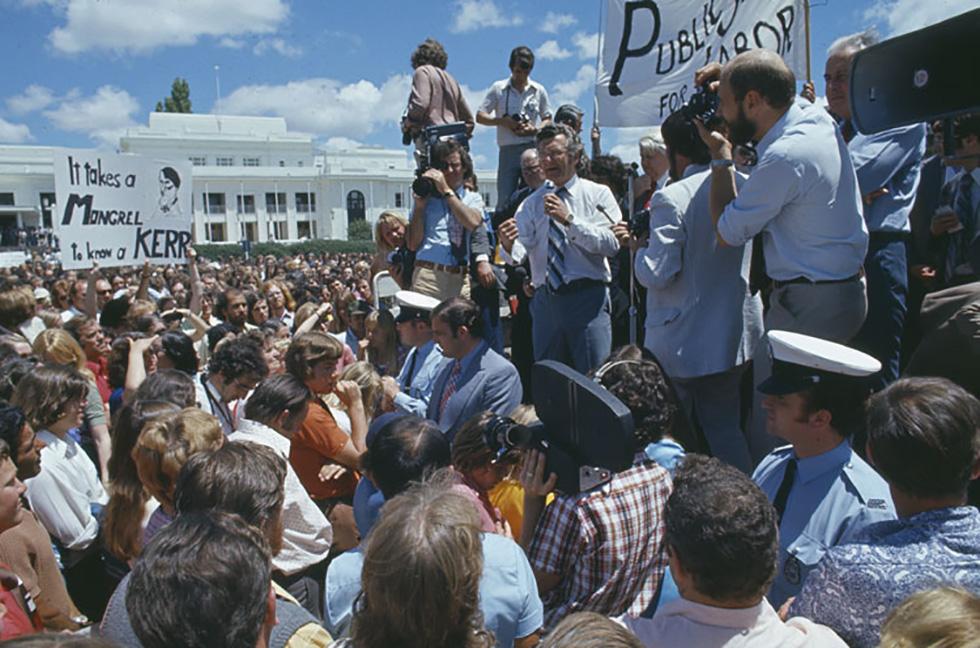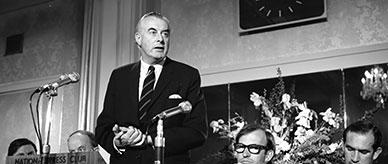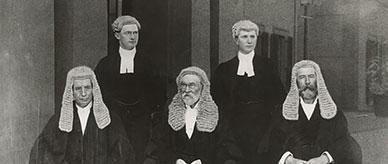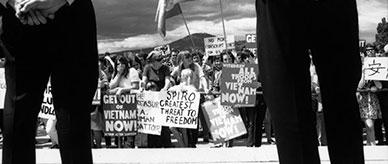


About this record
This colour photograph was taken on the lawns outside Old Parliament House in Canberra on 12 November 1975—the day after the Governor-General, Sir John Kerr, had dismissed the elected Australian Prime Minister, Gough Whitlam.
The photograph shows a large rally protesting the dismissal of the Whitlam government. Bob Hawke—then President of the Australian Council of Trade Unions (ACTU) and National President of the Australian Labor Party (ALP)—is addressing the crowd. Dismissed prime minister Gough Whitlam is on the right of the frame, partly obscured by a loudspeaker.
Educational value
- This photograph records part of an event that is now referred to as 'the dismissal' or the 'constitutional crisis' of 1975. On 11 November 1975 the Governor-General, Sir John Kerr, revoked Labor Prime Minister Gough Whitlam's commission to form a government—even though Whitlam’s Labor Party held a majority in the House of Representatives.
- The Governor-General's aim was to break a constitutional impasse. The Labor government had presented the Federal Budget to Parliament but the Senate had refused to approve the supply of funding. The Senate could do this because it was controlled by a coalition of two opposition parties—the Liberal Party and the Country Party (now known as the Nationals)—and their allies.
- When the Senate refused to ‘pass supply’ it was refusing to pass money or appropriation bills that form part of the budget process. Without ‘supply’, government programs and services could not be delivered and the salaries of government employees (including the armed forces) could not be paid.
- The photograph shows ACTU President Bob Hawke speaking at a large protest rally in Canberra, on the lawns of Old Parliament House. Many at the rally were angry, and a number of unions called for a nationwide strike. Hawke feared that industrial action could lead to rioting and he urged restraint—calling on workers to donate a day's pay to the ALP election campaign instead of striking. Despite Hawke's appeal, some workers did take strike action.
- Around 5000 people attended the Canberra rally. Protesters included public servants, students, and transport and building employees. The rally passed a motion condemning Whitlam's dismissal and called on ACT workers to give the ALP 'a day's pay for democracy'.
- In the photograph, a group of protesters holds up a placard with a caricature of the Liberal Party leader Malcolm Fraser, who had been appointed as caretaker prime minister by the Governor-General, Sir John Kerr. In a play on Kerr’s name, one poster says 'It takes a Mongrel to know a Kerr'. A banner on the right of the photograph proclaims 'Public Servants for Labor'.
- In the days immediately following the dismissal, rallies were held in city centres throughout Australia. Despite these shows of support, Fraser's conservative coalition won the 13 December election with a massive swing of 7.4 per cent against Labor.
- The photograph records the association between the trade union movement and the ALP. The rally was organised by the Australian Capital Territory Trades and Labour Council and the Public Servants' Fund for Labor and it was addressed by a number of union leaders and Labor politicians, including Whitlam.
- Public servants were among Whitlam's supporters. In mid–October, political commentators were warning that, without passage of supply, the government would run out of money to pay its bills within weeks. The government's bills included public servants' salaries, capital works and recurring costs such as programs, services and grants.
- Media interest in the events surrounding Whitlam's dismissal was high. ‘The dismissal’ and the events leading up to it remain the most dramatic and controversial news story in Australian political history.
- Bob Hawke was ACTU President from 1970 until he entered parliament in 1980. He became Australia's longest–serving Labor prime minister, winning a Labor record of four successive terms (from 1983 until 1991). Hawke's leadership style was consensus–based and he achieved a degree of accord between unions and business.
Acknowledgments
Learning resource text © Education Services Australia Limited and the National Archives of Australia 2010.
Related themes
Need help with your research?
Learn how to interpret primary sources, use our collection and more.



